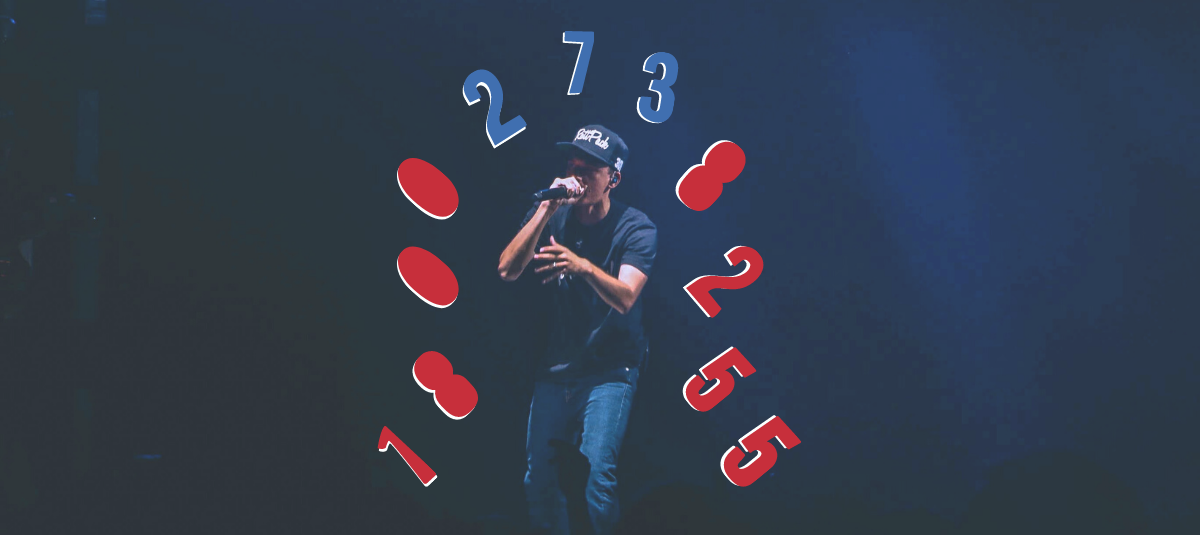Content Warning: This piece contains mentions of suicide statistics.
“I’ve been on the low, I been taking my time/ I feel like I’m out of my mind/ It feel like my life ain’t mine/ Who can relate?”
1-800-273-8255 by Logic, 2017
Four years ago, Logic made headlines in a unique way, to say the least, for a musician: by talking about mental health. His performance of his hit platinum song “1-800-273-855” at the 2017 MTV VMAs trended worldwide and captured the attention of millions of viewers. Not only was the song itself a hit, but Logic had made a statement when he had dozens stand on stage alongside him wearing shirts that read “1-800-273-8255” and “You are not alone.” Following the success of the song and subsequent questions about why Logic had chosen to write about a topic like mental health, he told GQ, “There was something about mental health and pain and suffering at that moment that demanded to be recognized, and I was ready to talk about it.” It turns out, others were ready to talk about it as well.
A new study released this week found that the song was associated with a swell of callers to the Suicide Prevention Lifeline. The study, published Monday in The BMJ, found that almost 10,000 calls went to the Lifeline, a 6.9% increase during 34 days in 2017 and 2018 when the song was receiving heightened public attention. An estimated 245 fewer suicides took place in that same time, a decrease of 5.5%.
As a mental health advocate, even from a young age, I had used and referred friends to the National Suicide Prevention Lifeline a handful of times. But, I often saw that my friends, peers, and classmates were still hesitant to seek help; however, they were more likely to ask for help when they saw that those they looked up to were sharing resources and openly talking about their mental health. I remember sitting around a lunch table with friends in 2018, and like a majority of our peers in the dining hall on campus, we were scrolling through social media. We saw that Demi Lovato had entered treatment for substance abuse and bipolar disorder. Later that day, we shared the news at our Active Minds Chapter meeting, and it spread like wildfire. I had never seen so many people in our chapter and campus community ready to talk about mental health, all because we were intrigued and inspired by their actions and bravery. Eventually, our campus newspaper picked up the story, and I started seeing commentaries all over social media. There was this unconscious sense of validation on campus. People felt understood, accepted, and heard.
The effect of self-disclosure is a widely studied phenomenon throughout the public health field. Research has shown the positive impact of self-disclosure on the normalization of mental illness has on a population or group. Fans and followers might look to their favorite actress, model, comedian, or athlete and think, “If they got help, I could get help, too.” They may even feel less alone because they have the same diagnosis. As a mental health speaker and advocate, I know that self-disclosure of mental illness can be a complex personal decision with personal costs and benefits. As such, it is very important that no one, celebrities, and influencers included, is forced into being a spokesperson for their mental health if they are not fully ready to do so. However, when they do choose to share, it can make a world of difference.
In the not-so-distant past, being labeled as mentally ill could spell the end of a career for any celebrity. Although stigma undoubtedly remains, a shift in celebrity culture around mental health seems to be occurring as more and more celebrities are coming out and talking about their mental health challenges and using their platforms to take control of the narrative. Now is the time for those with the platforms and power to stand up and share their stories how they see fit and help to change the culture around mental health. We’ve seen time and time again how sharing stories of hope, help-seeking, and resiliency can help to destigmatize mental health and raise awareness of available resources. We just need to be brave enough to speak up.




